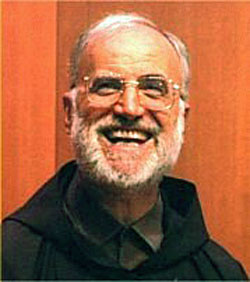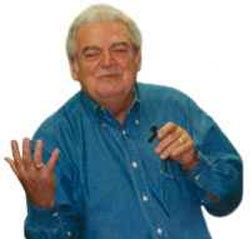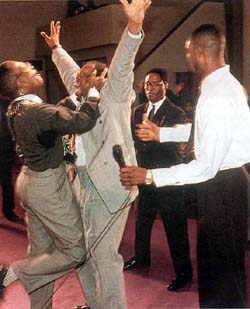 |
Consequences of Vatican II
From Pentecostalism to Apostasy
John Vennari
The Council of Trent defined dogmatically that without the Catholic Faith, "it is impossible to please God." (1) The Catholic Church also defined ex cathedra that there is only one true Church of Christ, the Catholic Church, outside of which there is no salvation. (2)
Pope Leo XIII, elaborating on this point, taught:
"Since no one is allowed to be remiss in the service due to God …. we are bound absolutely to worship God in that way which He has shown to be His will …. It cannot be difficult to find out which is the true religion if it only be sought with an earnest and unbiased mind; for proofs are abundant and striking …. From all these [proofs] it is evident that the only true religion is the one established by Jesus Christ Himself, and which He committed to His Church to protect and propagate." (3)
1. Session V on Original Sin. See Denzinger n. 787.
2. The Church has defined this three times. The most forceful and explicit definition comes from Pope Eugene IV when he defined ex cathedra at the Council of Florence on Feb. 4, 1442: "The Most Holy Roman Church firmly believes, professes, and preaches that none of those existing outside the Catholic Church, not only pagans, but also Jews, heretics, and schismatics can ever be partakers of eternal life, but that they are to go into the eternal fire "which was prepared for the devil and his angels," (Mt 25: 41) unless before death they are joined with her; …. No one, let his almsgiving be as great as it may, no one, even if he pour out his blood for the Name of Christ, can be saved unless he abide within the bosom and unity of the Catholic Church."
3. Pope Leo XIII, Encyclical Letter, Immortale Dei, apud Denis Fahey, The Kingship of Christ and Organized Naturalism (Dublin: Regina Publications, 1943), pp. 7-8.
From these sources, and from countless other magisterial teachings, it is clear that the only religion positively willed by God is the religion established by Christ Himself, the Catholic Church.

Fr. Cantalamessa a known progressivist was chosen to be the Pope's preacher |
Yet, at the Vatican's Good Friday Liturgy, 2002, the Preacher to the Papal Household, Capuchin Fr. Raniero Cantalamessa, said the other religions "are not merely tolerated by God …. but positively willed by Him as an expression of the inexhaustible richness of His grace and His will for everyone to be saved." (4)
4. All quotes from Fr. Cantalamessa's sermon are from the April 2, 2002 Catholic News Service report.
This, in short, is apostasy.
St. John, the Apostle of Love, said: "Who is a liar but he who denies that Jesus is the Christ? This is Antichrist who denies the Father and the Son" (1 John 1: 22). Thus, Islam, Judaism, Hinduism, Buddhism, any religion that rejects Christ, according to Scripture, is an Antichrist religion.
Regarding heretical religions, for example, "Orthodoxy" and Protestantism, St. Paul tells us that false creeds are the "doctrines of devils" (1 Tim. 4: 1).
How, then, can Antichrist religions, and false creeds of heretics, which are "doctrines of devils," be regarded as "not merely tolerated by God but positively willed by Him"? This would mean that God positively wills religions to exist that teach Jesus Christ is not God and the Savior of mankind (as do non-Christian religions). It means that God positively wills religions to exist, such as Protestantism, that teach Christ did not establish the Church, did not establish the Holy Eucharist, did not establish the Sacraments. It also means that those Protestant sects that hold devotion to Our Blessed Mother in abhorrence are positively willed by God. This, despite the fact that Our Lady of Fatima asked for the Five First Saturdays of reparation for the blasphemies against her Immaculate Heart that are the fruit of these false religions.
In short, Fr. Cantalamessa's sermon means that God positively wills error. God positively wills lies. God positively wills evil.
Our Lord certainly permits evil, for He does not interfere with the free will of man. But it is blasphemy to claim that God wills it, since God cannot will that which is not good.
Is Jesus full of pride?
Fr. Cantalamessa's blasphemy does not end here. He also claimed that God is "humble in saving," and the Church should follow suit. "Christ is more concerned that all people should be saved than that they should know who is their Savior," he told a large congregation at St. Peter's Basilica, which included Pope John Paul II and top Vatican officials.
It might sound sweet, but Fr. Cantalamessa is indirectly accusing Jesus Christ of pride. When he says, "Christ is more concerned that all people should be saved than that they should know who is their Savior," this is a pious snub to the pre-Vatican II teaching of 2000 years that holds it necessary for the soul to know, love and serve Christ in this world if he wishes to be happy with Him forever in the next. Fr. Cantalamessa is thus advocating the heterodox teaching of Fr. Karl Rahner on the "anonymous Christian."
In fact, only 50 years ago, if a 7-year-old student in Catholic school mouthed Fr. Cantalamessa's novel doctrine, he would have been deemed unfit to receive First Holy Communion. Now, 40 years into Vatican II's "new Springtime," this apostasy is preached on Good Friday at the Vatican by the preacher to the Papal Household.
This episode also reveals one of the many disadvantages of the Internet. News of Fr. Cantalamessa's homily was broadcast around the world via the Internet to thousands of Catholics who would have never otherwise heard it. The result is that many Catholics assume the Capuchin's words delivered in St. Peter's somehow approach the level of magisterial teaching. This is not true. Fr. Cantalamessa's Good Friday address is simply another homily filled with errors delivered by a Charismatic. It is that and nothing more.
Pentecostal papal preacher
Who is Fr. Raniero Cantalamessa?
To learn his story, we must go back to the 1977 pan-denominational Charismatic Conference held at a football stadium in Kansas City, Missouri. This conference was attended by 50,000 people from at least 10 different denominations including Baptists, Catholics, Episcopalians, Lutherans, Messianic Jews, non-denominational "Christians," Pentecostals and United Methodists. (5)
5. See details in John Vennari, Close-ups of the Charismatic Movement, (TIA, Los Angeles, 2002), Chapter I.

Protestant Mumford was invited to speak to the Catholic charismatics.
What "spirit" is he transmitting? |
At one point, Protestant Bob Mumford was preaching to the 50,000. Mumford lifted up his Bible and said, "And if you sneak a peak at the end of the book, Jesus wins!" This sent the crowd into pandemonium. The entire football stadium suddenly erupted into an extended cheering, "praise-frenzy" that lasted about 17 minutes.
Charismatics call this "the Holy Ghost breakdown." They interpret this natural, pep-rally enthusiasm as the Holy Spirit moving through the crowd, uniting the crowd (containing Catholics and members of various denominations) and inspiring this raving jubilation. This, according to them, is the "breaking down of denominational walls" that is positively willed by the Holy Spirit, even though it defies 2000 years of Catholic teaching on the one true Church of Christ. It also defies the traditional Catholic teaching that forbids Catholics to engage in positive religious camaraderie with false religions. (6)
Nevertheless, at the Kansas City conference, there was a Capuchin priest named Fr. Raniero Cantalamessa who had come from Milan to investigate the Charismatic Movement. He was so impressed with this rootin' tootin' praise frenzy that he became, in charismatic lingo, an "anointed preacher of the Charismatic Renewal." (7)
In 1980, this same Fr. Cantalamessa was appointed by Pope John Paul II as Preacher to the Papal Household. Now, this "anointed preacher" is given a pulpit in St. Peter's Basilica on Good Friday to tell the world that God positively wills false religions.
No wonder another Papal theologian, Cardinal Luigi Ciappi, who had access to the complete Third Secret of Fatima, said, "In the Third Secret it is foretold, among other things, that the great apostasy in the Church will begin at the top." (8)
6. Pope Pius XI, Encyclical Mortalium animos; George Hay, "Ecumenism Condemned by Sacred Scripture."
7. I saw Kevin Ranaghan tell this story at the 1997 "Catholic" Charismatic 30th anniversary conference in Pittsburgh. The lecture, called "Witness," is produced on cassette by Resurrection Tapes.
8. Apud Gerard Mura, "The Third Secret of Fatima - Has it Been Completely Revealed?" Catholic Family News, March 2002.
Error is not a gift of the Holy Ghost
Fr. Cantalamessa's Good Friday sermon is one of many powerful illustrations that the Charismatic Movement is not truly of God. Charismatics claim, either directly or indirectly, that they have a special hotline to the Holy Ghost that other Christians do not possess. They claim to be especially filled with the Spirit! But if a Catholic is "filled with the Spirit," it should be evident from his words and actions that he is filled with the Seven Gifts of the Holy Ghost.
One of the Seven Gifts of the Holy Ghost is the Gift of Understanding, which gives the soul a deeper understanding of revealed truths. Fr. Adolph Tanquerey defines it as "a gift which, under the enlightening action of the Holy Ghost, gives us a deep insight into revealed truths, without however giving a comprehension of the mysteries themselves." (9)
The effect of the Gift of Understanding is that it enables us to penetrate into the very core of revealed truths and gives us a deeper grasp of them. Yet Charismatics, who continually boast of being "filled to overflowing with the spirit," constantly spout religious errors. (10) Far from possessing the Gift of Understanding, they appear to be bereft of even the most fundamental truths of the Catholic Faith.
9. Adolph Tanquerey, The Spiritual Life: A Treatise on Ascetical and Mystical Theology, (Tournai: Desclee, 1930), pp. 627-628.
10. For greater detail, see J. Vennari, Close-ups of the Charismatic Movement, passim.
In fact, as one can see in my book Close-ups of the Charismatic Movement, the entire Charismatic Movement in the Catholic Church was founded on an objective mortal sin against Faith.

A close-up of the "slain in the spirit" - some persons on the floor, others dancing in trances. |
In 1967, a group of Catholics in Pittsburgh attended a Protestant Pentecostal gathering. The Protestants, who as members of a heretical religion possess no sacramental power, laid hands on the Catholics. These Catholics began babbling in "tongues" and claimed to be "filled to overflowing with the spirit" as a result.
The actions of these Catholics defy the 1917 Code of Canon Law, which was in force until 1983. Canon 1258 states, "It is absolutely not licit for the faithful either to actively assist at or to take part in non-Catholic ceremonies." Yet according to Charismatics, Catholics will be rewarded with a special influx of Holy Spirit if they thus violate Church law.
Further, seeking holiness from members of non-Catholic sects defies Catholic teaching that neither salvation nor sanctity (holiness) is found in non-Catholic religions. Pope Pius XII restated this doctrine within the context of a prayer to the Blessed Virgin:
"O Mary, Mother of Mercy and Seat of Wisdom! Enlighten the minds enfolded in the darkness of ignorance and sin, that they may clearly recognize the Holy, Catholic, Apostolic, Roman Church to be the only true Church of Jesus Christ, outside which neither sanctity nor salvation can be found" ( RAC: 626.11).
By contrast, "Catholic Pentecostalism," in the words of its prize preacher, claims that non-Catholic religions wherein "neither sanctity nor salvation can be found," are positively willed by God.
Here we see one of the many ways in which "Catholic Pentecostalism" leads to apostasy.

Posted June 10, 2004
|
Vatican II | Hot Topics | Home | Books | CDs | Search | Contact Us | Donate

© 2002- Tradition in Action, Inc. All Rights Reserved
|
 |
|